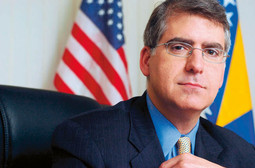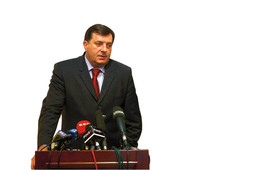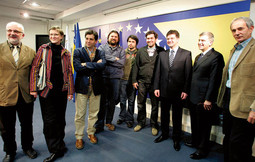Published in Nacional number 685, 2008-12-30
A vocal American
Dodik's greatest enemy
Raffi Gregorian, the Deputy High Representative of the International Community in Bosnia & Herzegovina, is vehemently opposed to corruption and crime in Bosnia & Herzegovina and to the president of the Republika Srpska
 Raffi GregorianUS diplomat Raffi Gregorian, the Deputy High Representative of the International Community in Bosnia & Herzegovina, has had a marked influence on that country in 2008. Surveys carried out by some media houses have billed him as the person of the year. With a long term knowledge of the situation in the Balkans, Raffi Gregorian has, like no one before him from the international community, openly and without beating about the bush, opposed corruption and crime among politicians in Bosnia & Herzegovina, levied monetary fines against some for inefficiency in their work, and has come into conflict with Milorad Dodik, the president of the Republika Srpska, of whom Raffi has said that he is surrounded by former military structures that are protecting Hague indictee Ratko Mladic, and that he is one of the chief brakes on Bosnia & Herzegovina's road to the EU. Before being named Supervisor for Brcko and Deputy High representative, Dr. Raffi Gregorian was a senior civil servant at NATO headquarters in Sarajevo responsible for defence reform, and worked as a political advisor to the NATO commander. He worked in 2005 as the vice chair of the Commission for Defence Reform in Bosnia & Herzegovina on behalf of NATO, and was appointed to the post by High Representative Lord Paddy Ashdown in December of 2004.
Raffi GregorianUS diplomat Raffi Gregorian, the Deputy High Representative of the International Community in Bosnia & Herzegovina, has had a marked influence on that country in 2008. Surveys carried out by some media houses have billed him as the person of the year. With a long term knowledge of the situation in the Balkans, Raffi Gregorian has, like no one before him from the international community, openly and without beating about the bush, opposed corruption and crime among politicians in Bosnia & Herzegovina, levied monetary fines against some for inefficiency in their work, and has come into conflict with Milorad Dodik, the president of the Republika Srpska, of whom Raffi has said that he is surrounded by former military structures that are protecting Hague indictee Ratko Mladic, and that he is one of the chief brakes on Bosnia & Herzegovina's road to the EU. Before being named Supervisor for Brcko and Deputy High representative, Dr. Raffi Gregorian was a senior civil servant at NATO headquarters in Sarajevo responsible for defence reform, and worked as a political advisor to the NATO commander. He worked in 2005 as the vice chair of the Commission for Defence Reform in Bosnia & Herzegovina on behalf of NATO, and was appointed to the post by High Representative Lord Paddy Ashdown in December of 2004.
NACIONAL: Do you feel that political control of the economy in Bosnia & Herzegovina is one of the key problems? What is at issue?
- While in 2005 and in 2006 many of the indicators of economic development and competitiveness showed that Bosnia & Herzegovina was making progress, over the past two years Bosnia & Herzegovina has lagged behind all of its neighbours. According to the Global Competitiveness Index Bosnia & Herzegovina fell from 88th place in 2005, which was a significant improvement from 2004, to 107th place. In the ease of doing business category Bosnia & Herzegovina has seen a massive drop from 91st place in 2005 to 119th place this year. In the region Bosnia & Herzegovina is now in last place in the overall ranking, in essence at the level of Albania, but with one significant difference – the perspectives of improvement in Albania. In 2005 and 2006 we were witness to an encouraging level of political and administrative pragmatism. The work program in the legislature was not brilliant, but it had begun addressing key reforms. 80 laws were adopted in the state-level parliamentary assembly, many of which lead to far-reaching reforms that were reflected as an increased GDP, direct foreign investment, an increased rate of employment and a low rate of inflation.
After the general elections in October of 2006, it became quite different and dreary. The results can be easily seen in the Parliamentary Assembly of Bosnia & Herzegovina, where only 20 new laws were adopted, one of which was an act to increase the wages of MP's. This is not even close to the levels required to effect accession to the EU, a process in which some candidate countries adopted several hundred laws a month.
NACIONAL: The Government of the Republika Srpska has filed criminal charges against you. Is this connected to your request that the same Government submits documentation on privatisation in Republika Srpska to the Prosecutor's Office of Bosnia & Herzegovina?
- The Prosecutor's Office of Bosnia & Herzegovina requested the documentation in the frame of an investigation into possible illicit activities on the part of officials of the Government of Republika Srpska. I did not, as you are suggesting, demand anything of the Prosecutor. As far as I know, the investigation was launched when the state agencies for the implementation of the law received information from the public on possible illicit activities, after non-governmental organisations and the press had for months expressed their concern in 2007.
It appears that these charges against me are based on reports placed in the Republika Srpska press, and it is surprising that a democratic government should use these kinds of methods. The Government of the Republika Srpska and the press that supports it had already launched a continuous propaganda campaign against me in January, when I met, together with diplomats from the USA, Britain, German, France and the OSCE, with non-governmental organisations, journalists and analysts who claimed that they were under pressure from the Government of the Republika Srpska. It was, then, very easy for them to add yet another falsehood to their existing repertoire of fabricated accusations. A lack of facts or details was no moral or intellectual obstacle to their efforts. There is no need to point out that these accusations are entirely unfounded. This is also illustrated by the fact that there are persons cited in the charges filed by Republika Srpska who have not been in Bosnia & Herzegovina for two years now, while the "solid evidence" relates meetings that were never held.
NACIONAL: You once said that Dodik was surrounded by people who did not have the best intentions towards the Republika Srpska. What exactly did you mean by that?
- People in the Republika Srpska should ask themselves who benefits from encouraging Dodik to enter into a conflict with the international community. These are certainly not people who wish to promote a positive image of the Republika Srpska. For the Republika Srpska and its Prime Minister it is much better if the international community sees them as a partner. Thos who are counselling Dodik to launch unfounded battles against the international community are only hurting the interests of the Republika Srpska. There is also no purpose in receiving fabricated information or in accepting advice from people connected to the former military structures, which the Serbian authorities are fighting in their search for Mladic. The Government of Serbia has grasped and admitted the danger these people pose to its democracy. That is why I am surprised that the current officials of the Republika Srpska are allowing themselves to be linked with these elements, people they themselves previously rejected. Milorad DodikNACIONAL: We have on several occasions heard demands out of the Republika Srpska that the OHR leave Bosnia & Herzegovina, and news was spread that you had been dismissed. What is behind these demands?
Milorad DodikNACIONAL: We have on several occasions heard demands out of the Republika Srpska that the OHR leave Bosnia & Herzegovina, and news was spread that you had been dismissed. What is behind these demands?
- As you can see, both the OHR and I are still here. The Peace Implementation Council is the body that decides when the OHR will close its doors, not the politicians of Bosnia & Herzegovina, and they know this. That is why all statements coming from domestic politicians concerning the date of the transition of the OHR no more that political posing. If they really wanted to close down the OHR and to see me leave, then the way to do that would be to fulfil the conditions and goals that the international community has set. Nevertheless Mr. Dodik must see some kind of political benefit in presenting me as the enemy, whether in having a foreigner to blame or to shift people's attention from other matters. I cannot think of any other explanation for a person who once referred to me as a friend.
NACIONAL: Do you think that Dodik and Haris Silajdzic are the greatest brakes on EU accession?
- They cite one another as the reasons for why they behave the way they do and say what they say. Over the past two years they have both made statements whereby they question their own obligation to abide by Dayton. Haris Silajdzic, president of the Party for Bosnia & Herzegovina (SBiH), has called for scrapping the Republika Srpska, while Milorad Dodik, president of the Alliance of Independent Social Democrats (SNSD) has threatened secession, hesitation in respecting the authorities of the state and its institutions and rejected cooperation with the OHR. Some people are trying to explain their behaviour as jostling for position ahead of real negotiations on constitutional reform. I wish it were so simple.
They have both also played a role in slowing the advancement of Bosnia & Herzegovina towards the EU. The president of the SBiH is to thank for the failure of the constitutional reforms of April 2006, rejected far-reaching reforms of the police in March of 2007, refused to accept improved constitutional amendments in May of 2007, and declined to sign the Prud Agreement. He has his reasons for doing so, which I understand, but he as yet to offer any realistic exit from the stalemate into which his rejection has brought us.
The president of the SNSD, on the other hand, talks of joining the EU, but is trying to negate the existing reforms which were a precondition for the negotiations on the Agreement on Stabilisation and Association to even be opened. Some concrete examples include his actions as pertains to the Civil Service Act, the state corporation for the distribution of electric energy and the public radio and television corporation. With these actions he is in fact extending the list of things Bosnia & Herzegovina has to change for the possibility of its candidature to be considered. Let's hope that the new Prud Agreement, whose signatory Mr. Dodik is, truly puts and end to this kind of behaviour and that it will develop and be implemented in a way that will take Bosnia & Herzegovina out of its current political stalemate.
 Miroslav Lajcak and Raffi Gregorian with the film and theatre directors of Bosnia & HerzegovinaNACIONAL: Is the financial power they get from directorships in various state-owned corporations and the control over real estate one of the reasons that national political parties remain in power for so long?
Miroslav Lajcak and Raffi Gregorian with the film and theatre directors of Bosnia & HerzegovinaNACIONAL: Is the financial power they get from directorships in various state-owned corporations and the control over real estate one of the reasons that national political parties remain in power for so long?
- Absolutely. Some people think that the chief problem is the constitutional structure of the country. I do not agree with this analysis. Even though the Dayton constitution could benefit from some improvements, the underlying problem is the political system, which was not at all defined in Dayton. The entire system is conceived to enrich and to empower ruling parties by way of control over state-owned property and companies.
The current example is political control of state-owned property. In Brcko we established that the main obstacle to the development of the economy and the opening of jobs was the ownership of the government of resources and we want to do away with that. Having in mind that it takes almost two years for a contract to be implemented by the courts in Bosnia & Herzegovina, and that it takes more than twice as long for a company to be registered than to be shut down, a way needs to be found that simplifies business activities in order to make them more profitable, and there by to encourage the opening of a greater number of jobs.
One way to do so, and to eliminate the chief sources of potential corruption, is to set up a system than encourages private ownership of construction and agricultural land. In late January I intend to present a draft act to the Assembly of the District of Brcko that will facilitate an all-encompassing sale of the land in state ownership that is not vital to carrying out the function of government. We started with the question of why the government was the greatest landowner. Is it a better manager than businesspeople? Is it better in administering the land than farmers are? Clearly the answer is no. The District covers about one percent of the territory of Bosnia & Herzegovina and has a population of a little over 100,000 – and yet just in Brcko you have real estate worth 500 million convertible marks in state ownership. That is a staggering figure. Imagine the figure for the whole of Bosnia & Herzegovina – real estate worth billions of marks in state ownership across the country, and thereby in the control of politicians.
NACIONAL: What do you think of the Dayton Agreement today?
- The Dayton peace accord was the best thing for Bosnia & Herzegovina at that point in time. It was the right thing, even if its only achievement was to stop the war. Of course, it was – and still is – much more than that. It was the first time that an agreement included and achieved the right to return, even if it was not to the full satisfaction of all. Joining Partnership for Peace, intensifying the dialogue with NATO, and the signing of the Agreement on Stabilisation and Association with the EU demonstrate that Dayton was not an obstacle to the needed reforms. Dayton is the beginning, not the end. The roots of today's problems are much more connected to individuals, latent animosities and war goals than they are to the future. That is clear when you remember how the previous government succeeded in adopting significant, positive, reforms, and the current government, which is, as regards its party political make-up, almost identical to the previous one, does not have these achievements.
NACIONAL: How do you look upon cooperation with the national leadership in Croatia as far as Bosnia & Herzegovina is concerned?
- Croatia has a positive role: she has reaffirmed her support of the sovereignty and territorial integrity of Bosnia & Herzegovina and is a constructive partner to the international community. She has fears related to the internal stability of Bosnia & Herzegovina, but those fears are best resolved through bilateral, regional and international forums. Croatia and Bosnia & Herzegovina share the same perspective as regards the European Union and NATO. Croatia has moved far from Bosnia & Herzegovina when it comes to joining NATO and European integration, but its experience can be put to good use in Bosnia & Herzegovina. I am happy that the Chairman of the Presidency of Bosnia & Herzegovina Nebojsa Radmanovic has appealed for an improvement of relations with Croatia in his New Year's address.
Related articles
China's CACGC wants to build the Zagreb Airport
Diplomatic and economic relations between Croatia and China are intensifying, with new interest of Chinese companies to invest in Croatia, which was… Više
Latest news
-
28.10.2010. / 14:15
'A profitable INA is in everyone's interest'
-
28.10.2010. / 09:38
Sanader’s eight fear SDP — Won’t bring down Government
-
21.10.2010. / 15:02
Interior Ministry turned a blind eye on Pukanic assassination
-
20.10.2010. / 09:34
Barisic could bankrupt HDZ




